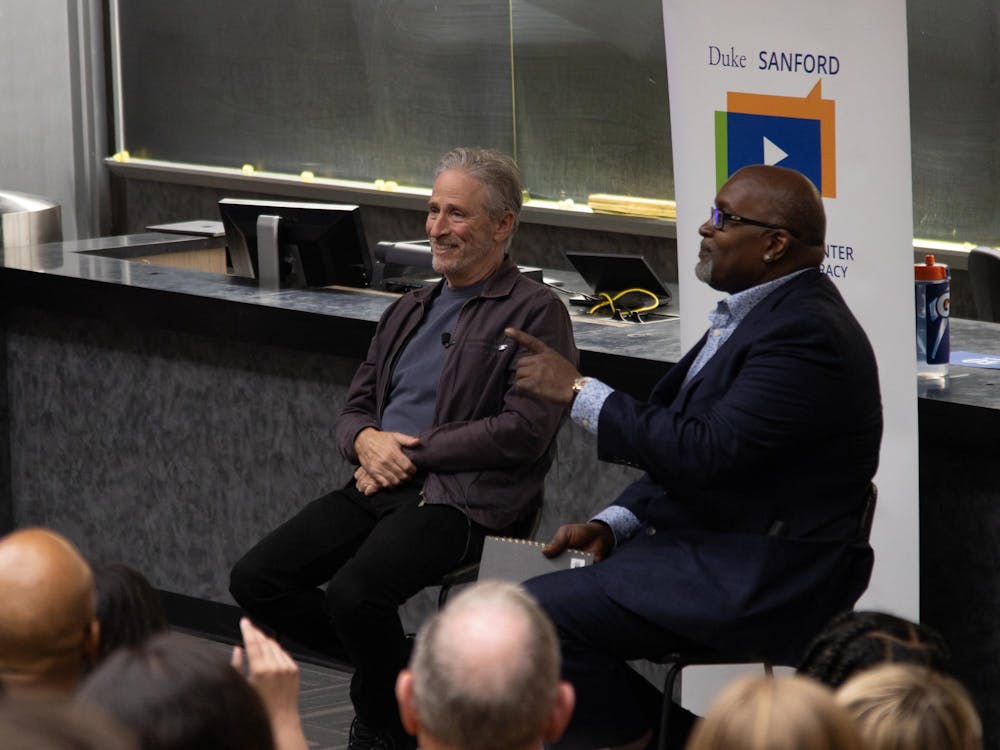Comedian and television host Jon Stewart visited Duke Thursday to share insights from his experience working in the communications industry for over three decades.
Stewart is best known for his work on Comedy Central’s The Daily Show, which he hosted from 1999 to 2015 and recently returned to in February. He is a 22-time Emmy Award winner, five-time Peabody Award winner and recipient of the 2022 Mark Twain Award for American Humor.
Stewart spoke as a guest lecturer for the Dewitt Wallace Center’s “Race and the Media” course, taught by Eric Deggans, adjunct instructor of journalism and public policy. The event, which took place in the Ahmadieh Family Auditorium in Gross Hall, was co-sponsored by the Sanford School of Public Policy as part of the Dewitt Wallace Center’s 50th anniversary celebrations.
Deggans interviewed Stewart about his experiences as a prominent voice on the late-night television scene before opening the floor for student questions.
“I feel like he helped instruct a whole generation of late-night TV viewers on the hypocrisies and the contradictions of modern media,” Deggans said.
He pointed to Stewart’s appearance on CNN’s “Crossfire” in October 2004 as a pivotal moment in political media. Stewart criticized the show — a daily political discussion program that featured left- and right-wing guests for debate — for its lack of nuance and sensationalist leanings.
“I was objecting to theater,” Stewart said. “None of it was good faith … it was designed particularly for theatrical conflict.”
CNN canceled Crossfire and fired Tucker Carlson, one of the show’s hosts, three months after Stewart’s visit. Many have speculated that Stewart’s caustic remarks contributed to the decision, but he maintained Thursday that the show had poor ratings long before his guest appearance and that the controversy surrounding his viral visit was a “convenient” excuse for executive producers to end the program.
“They continued to ply the axis of right versus left, of conservative versus liberal, as though that’s the important conflict in this country — or any country — rather than good faith and bad faith or integrity and corruption,” Stewart said. “Those are the axes that a good news organization would dedicate itself to.”
Stewart also spoke about his return to “The Daily Show” over a year after Trevor Noah left his hosting position of seven years in September 2022. Stewart noted that the show had been “adrift” after Noah’s departure and the writers’ strike that ensued in the summer of 2023, whose impacts were felt by the entire media industry.
“The most important thing in any creative or ideating endeavor is to have a clarity of vision but a flexibility of process and collaboration,” Stewart said, framing much of his address as advice to the room of prospective journalists and public policy students.
He spoke about how he doesn’t spend time thinking about the reaction of his audience and trying to cater to various interest groups with his comments, but instead prioritizes context and fairness, ensuring that he is accurately representing the events and public figures he discusses.
Stewart also commented on the structural barriers faced by many entering the media industry.
“The systems that are in place are not necessarily in place because they are malevolent, but they are in place because they’re perpetuating a status quo that doesn’t involve bringing in more voices,” Stewart said.
Stewart explained that when he first started working for Comedy Central, it took a while for those in the industry to realize the socioeconomic barriers that exist for new comedians. The company offered unpaid summer internships in New York City — notorious for its high cost of living — as its primary method of entry to the business, with many full-time workers later sourced from this pool of previous interns.
When the company made a policy change around a decade ago to begin paying its interns, Stewart revealed that “suddenly, the whole group expanded.”
He added that the industry suffers from a similar style of structural discrimination in its hiring of female writers, referencing a 2010 article published in Jezebel that accused “The Daily Show” of being a “boys’ club.” After initially being offended by the allegation, Stewart realized that very few women actually worked in the industry because of this "hiring from within" process and even fewer held executive positions — something he has since worked to address through thoughtful hiring practices.
“It takes active thinking and creative thinking to break down those tributaries … if you look at the climate, you can begin to design a system that’s actually more meritocratic,” Stewart said.
Stewart commented on the danger he sees in increasingly polarized media, which he tries to combat by refusing to pander to one side of the aisle in his satirical specials and rejecting the concept of a political binary altogether.
“My job is to expose the absurdity of it all, because that’s what I think I do best,” he said. “[What] I am doing on my show [is] an expression of my art, and that’s kind of it. I hope you get something out of it.”
Get The Chronicle straight to your inbox
Signup for our weekly newsletter. Cancel at any time.

Zoe Kolenovsky is a Trinity junior and news editor of The Chronicle's 120th volume.

